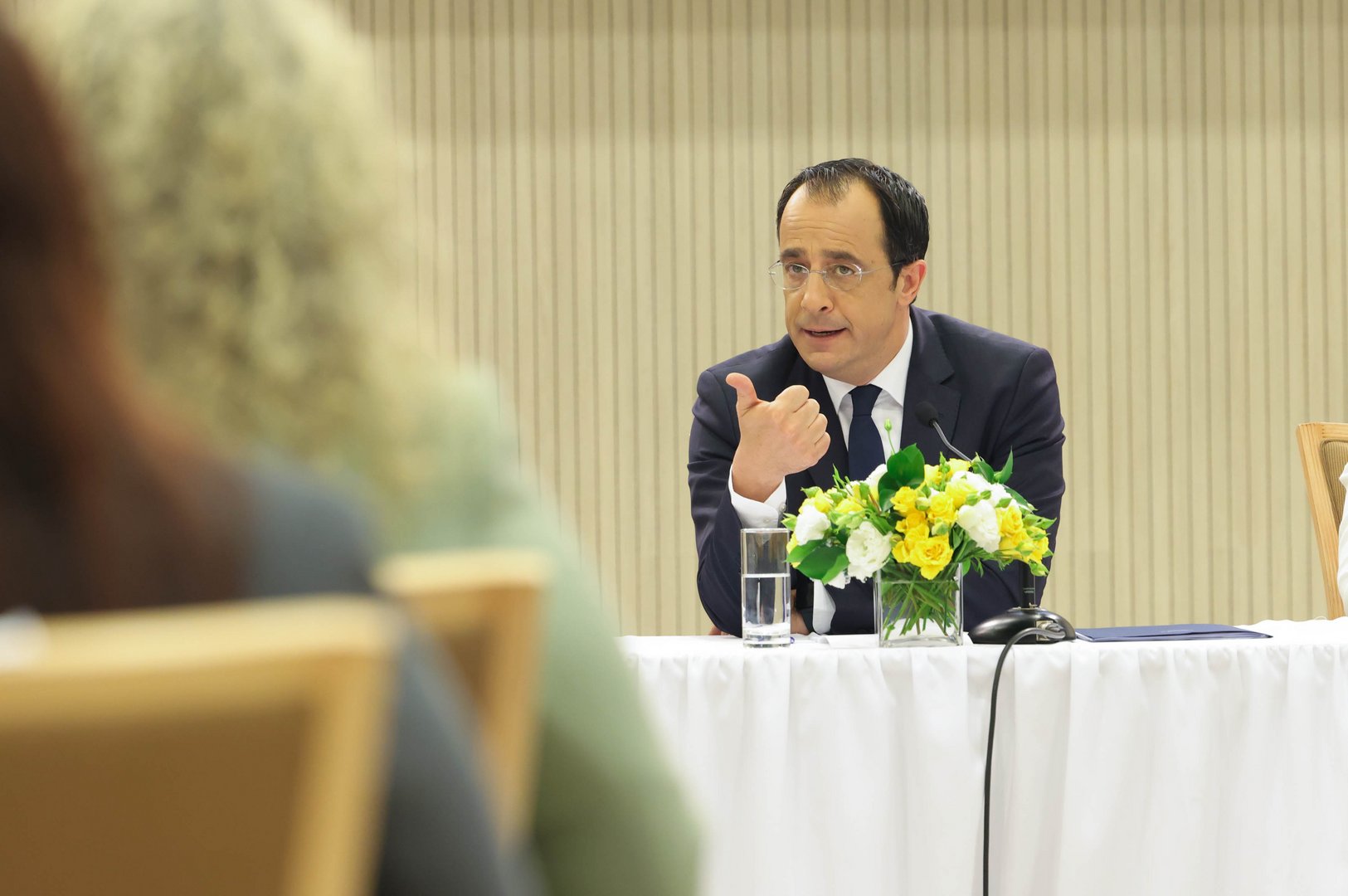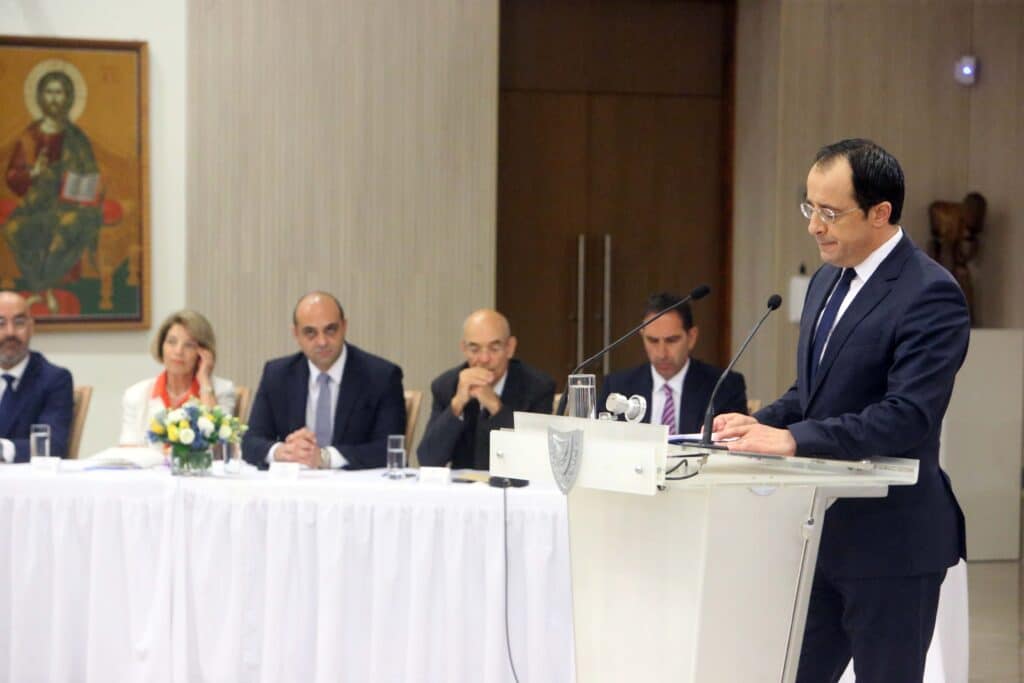President Nikos Christodoulides on Tuesday announced an upcoming plan to address the housing crisis, that moves are underway to improve bicommunal ties, and a mechanism towards greater government accountability will be established.
The president sought to cut through the noise on social media and elsewhere by speaking directly to the public through a press conference to address his first 100 days in office – but faced some tough questions from a skeptical press pool.
Flanked by key members of the cabinet at the presidential palace, Christodoulides presented an overview of the new government’s victories achieved so far – ranging from a deal on the cost-of-living allowance (CoLA) and reducing migration to increasing support for low-income pensioners.
But after his speech, the president faced a barrage of questions on the government’s policy on the Cyprus problem, with concerns also raised over allegations of nepotism and the mishandling of appointments to public positions.
The Cyprus Mail asked Christodoulides what the government’s next steps are to improve the relationship between the two communities across the divide.
“This is the first time that I am saying this publicly in that I had a meeting with a team of our Turkish Cypriot compatriots at my offices, upon my request, and we discussed a series of measures which the government may take on its own,” he said.
“And I must emphasise that – from our side alone – because as a result of the current situation with [Turkish Cypriot leader Ersin] Tatar it is difficult for there to be agreements [between the two sides]”.
He hoped that by September the government will be ready to make specific announcements but, “which I repeat, do not require any moves from the occupying force”.
Christodoulides emphasised that it is a matter that concerns the government and noted that he has received proposals on the issue from Akel secretary general Stefanos Stefanou.
The president also took the opportunity to offer both an overview of what the government has done but also a roadmap for the direction ahead.
A key point was greater government accountability and transparency, with the president announcing the establishment of a ‘government project monitoring group’. This, he said, will be staffed with personnel from the public and wider public sector, and will have all the tools necessary to monitor the government’s work – in line with European Commission standards.
He also announced a review of the current support for housing – vowing that by September an action plan will be completed. He acknowledged that young people in particular are facing immense pressure.
Christodoulides’ candidacy and subsequent presidency were based on the support of a diverse range of political parties and the concern is that the new administration will struggle to get the required bills through parliament.
He said the parties are aware of whom the people voted for as president and that Cyprus stands to gain massively from EU funds, but that support is at risk unless bills are passed through parliament.
“The people will judge accordingly if party politics puts that at risk,” he said.
On a similar note, Christodoulides was asked whether he has the support required to pass through a Cyprus solution should the situation arise. It was noted that key parties which back him do not share his view of what a Cyprus solution would look like – but the president did not provide a clear answer to that concern.
Asked about the seeming inaction and lack of comments from the government on recent moves by the north and Turkey, particularly in Varosha, Christodoulides replied that a series of negative press announcements is not what will solve the Cyprus problem.
He then again referred to his policy of pressing for greater EU involvement in the process to break the deadlock, insisting that there has been progress.
“The EU has the necessary incentives [for Turkey], the UN does not,” he said, but reiterated that any solution must be based on the relevant UN resolutions.
Elsewhere, Christodoulides outlined the challenges the new government faced just weeks after coming into power – most notably from a new tranche of Western sanctions against Russia, in which Cyprus became entangled.
But the president said he has no information regarding new sanctions.
The press conference was billed as an opportunity to inform the public of the government’s policies and actions – therefore dispelling unjustified criticism, but others viewed it as the president trying to get ahead of bad press and a lackluster start.
For many, its policies and debates on bills in parliament have been overshadowed by a series of early “own goals”.
Critics say that there were hopes Cyprus would turn the page on corruption, but these were soon dashed after a number of appointments as ministerial ‘advisors’ – persons either very young, supposedly unqualified and with ties to Christodoulides’ camp – backfired spectacularly.
The president responded on Tuesday by acknowledging that some cases were mishandled but insisted that the focus should instead be on these mistakes being immediately addressed, not having been covered up.
The new government was sworn in on March 1.
Some analysts have viewed the government’s more successful policies as coming from the interior ministry, headed by former health minister Constantinos Ioannou.
Those include the overhaul of refugee housing as part of the state’s ‘Ktizo’ scheme, along with the its handling of the migration issue – such as creating a new deputy migration ministry and reducing the number of rejected asylum seekers.
The symbolism surrounding the first 100 days in office came from US President Franklin Roosevelt’s first three months in power, where the administration pressed through major bills to get the economy back on track.
That’s a lot to live up to, but often the expectations from the first 100 days are self-imposed – candidates on the campaign trail seemingly promise the earth and seek to energise voters.
The first 100 days are viewed as a sweet spot where the administration can take credit for the positive developments but also bat away most complications – “it’s what we inherited, we haven’t had time yet” and so on.







Click here to change your cookie preferences